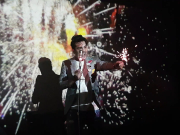Coke Studio releases Fifth Episode of Season Seven featuring ‘Mujhe Baar Baar’ by Abbas Ali Khan, ‘Mitti da Pehlwan’ by Jawad Ahmad, ‘Pehla Pyar’ by Jimmy Khan & ‘Khairiyan de Naal’ by Niazi Brothers
[Pakistan: 18th October 2014] Following the announcement of its fourth episode, #CokeStudio7 Episode Five will air on Sunday 19th October 2014 across all leading broadcast networks nationwide featuring ‘Mujhe Baar Baar ’ by Abbas Ali Khan, ‘Mitti da Pehlwan’ by Jawad Ahmad, ‘Pehla Pyar’ by Jimmy Khan & ‘Khairiyan de Naal’ by Niazi Brothers. In respect of Muharram, Episode 6 of Coke Studio Season will be aired next on Sunday 16th November 2014 .
The supremely accomplished Abbas Ali Khan returns to Season 7 with a foreboding, epic rendition of a Sufi kalam. ‘Mujhe Baar Baar’ was written by the contemporary Sufi poet, Hazrat Baba Gulzar Sabri, and Abbas has performed it in his 2014 album, Tamam Alam Mast. The song speaks out against the rigid notions of orthodoxy, and the idea of compulsion in faith. The poet speaks of the untainted, transcendental nature of his faith which is based in unconditional love of the Almighty. The idea of faith as an obligation appears antithetical to the one who has annihilated his desires for the one true Love. The composition for this track is partly based on Raag Darbari, which originated in southern India and was brought to the North Indian tradition by the legendary Tansen, composer to Akbar the Great. A grave raag played in the deep of the night; it showcases the gravity inherent in the song. For the Coke Studio version, Abbas Ali Khan is joined by the acclaimed guitarist Shallum Xavier. Both his work and that of the strings section add a contemporary flavour to the song’s inquisitive, introspective ecstasy. The various streams of sound work towards a memorable crescendo of the chorus, with Abbas Ali Khan joining in with delicately phonated vocal ornamentations adorning the tapestry created primarily by stringed instruments.
Born to two professors of political science, Jawad Ahmad’s musical career is testament to his commitment to infusing his songs with the progressive politics and emancipatory spiritualism he believes in. ‘Mitti da Pehlwan’ is a song which mocks humanity’s obsessions with its own facile creations, and reminds it of how life is transitory. Mitti, or dust, is used as a metaphor across the song, referring to the belief that human beings are created from clay as well as the transitory nature of getting blown away as mere dust, as time moves on and we are no more. Jawad’s performance specifically retains the populist flavour of the song and its message. Such songs are the hallmark of folk and rural performances, and use common language and expressions to convey profound spiritual ideas. The listener is both ridiculed and entreated, and the marvel of the lyrics lies in their usage of the same words to deliver profound concepts. The arrangement of this song is also one of the most original ones of the season, bringing together a bossa nova percussive style with flourishes of funk and pop in the melody. It retains the gregarious nature of the performance, and adds a light, almost flippant and dismissive feeling when the gravity of the message delivered is dramatically juxtaposed with the musical styling of this decidedly versatile, Punjabi song.
‘Pehla Pyar’ was the first song Jimmy Khan ever wrote in Urdu, and both the song’s genesis as well as its lyrics, speak of a youthful, naïve optimism. Although he currently performs with his band, Jimmy Khan and the Big Ears, this song was written back when he was a solo performer. Pehla Pyar had been intended as outlining Jimmy’s beginnings in song-writing, but it continued to grow in popularity over time, and was one of the two songs he was asked to perform at Coke Studio. Sang to an old love, it recounts the sepia-tainted, consequence-free memories of young love and its attendant obsessions – declarations of affection, clandestine meetings, aimless wanderings, musing over every fragment of the beloved’s existence. Structured similarly to the original version by Jimmy Khan, the Coke Studio version’s star is the flute, which is performed with gleeful abandon in the style often used by prog-rock bands. Yet it retains the ability to awaken the sense of nostalgia for an obsession lingering with a sweet aftertaste yet.
The mythical character of Heer is one of the subcontinent’s greatest muses, and has inspired some of the region’s most iconic and celebrated songs, poems and stories. Yet even across this vast corpus of art, stretching across centuries, ‘Khairiyan de Naal’ stands as amongst the finest examples of its kind. Babar and Javed Niazi, global icons of South Asian folk and classical singing, have preserved the evocative performing style created by their father, Tufail Niazi. Tufail Niazi, himself a towering legend in subcontinental singing, honed his style while singing this at the innumerable melas or fairs which dot the countryside. Sung with a gusto that retains the sense of tragedy inherent to the song, the lyrics are from the perspective of Heer. She sings these as she is being married off to a groom from the Kher tribe, and she laments that she does not want to be sent off with them. She sings the virtues of her true love, Ranjha, and in the style of all Sufi poetry, both the declarations of her love and the descriptions of the Beloved are allegories for divine love itself. The Coke Studio version of the song captures the wistfully defeated melancholia of Heer’s refrain, with the tabla anchoring the musical arrangement, as the flute makes our pain for Heer take flight. The songs ends with the flute racing across a gasping percussion and a piano driven hope, evoking the spirit of Heer soaring above the confines of society for dreams never lived nor passions actualized.




































